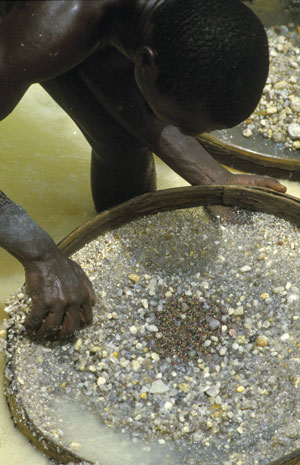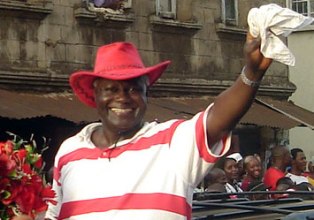Sierra Leone at a cross roads
Austin Thomas
18 October 2011
Some people see in Sierra Leone’s political and
economic failings, proof that we are incapable of
ruling ourselves. Such people may also believe that
the colonial powers opted out of the continent
prematurely and that some more years of tutelage
might have made a difference.
In this liberal age, such views are rarely spoken
openly by either the enemies or friends of Sierra
Leone.
But it would be naive to think that Sierra Leone's
experience has not raised questions about the
quality of character and minds of its people. The
doubt certainly occupies the thoughts of many of us
as we watch our prostrated country treated as a
basket case.
Before independence, Sierra Leone was doing well. It
exported rice and had one of the strongest economies
in Africa. The exchange rate was Two Leones to the
British Pound, we were better off than Japan and the
Asian Tigers.
 |
|
After independence, the problem started.
We stopped exporting rice, the
infrastructure left behind was hardly
maintained, we allowed poverty to get
worse, standard of education fell, the
economy took a nose dive and we ended
with a civil war that lasted ten years.
The country is said to be blessed with
abundant natural riches, but cursed with
wicked and heartless politicians that
only care about themselves and their
families.
Ordinary Sierra Leoneans, bewildered and
disappointed by the outcome of
self-rule, find little around them to
instil the confidence required to manage
our own resources. |
In some respects, Sierra Leoneans are now more
vulnerable to theories of black inferiority than
they were during colonialism. Under colonialism they
could dream that with liberation comes the
opportunity to prove our worth.
The future was uncompromised by the failures of the
present. And after more than three decades of poor
governance, many Sierra Leoneans have lost faith.
 |
|
During the 2007 elections, most Sierra Leoneans were
of the opinion that none of the political parties
vying for power will govern the country well.
But the majority nonetheless, opted for the APC
under Ernest Koroma. Were they right in their
judgment?
|
Recently reading stories on-line about Sierra Leone,
I came across an article where the writer said that;
since all our leaders have tried their best, and
their best have not improved the lives of Sierra
Leoneans, why don’t we ask our colonial master to
come back and recolonize us, because under British
rule peoples’ lives were far better.
That statement was written by the writer with
sincerity, and has been echoed by many other writers
across Africa, because of the economic hardship
facing the continent.
SLPP ruled from Independence to 1967 – before I was
born; and some people say that it was the beginning
of Sierra Leone’s demise, whilst others argue that
the country was doing well then, with every area of
state governance functioning well.
Then came APC and they stayed in power for 24 years.
In those 24 years, conditions in the country were
very harsh - economically, politically and socially.
Those were 'trying times' for the people of Sierra
Leone.
I must say though, that APC did well in terms of
giving the country’s infrastructure a facelift. But
it should be noted also that during that period,
many African countries such as Kenya, Ethiopia,
Tanzania, Ivory Cost, Senegal, had progressive and
forward thinking leaders in power.
Those African countries were developing fast
compared to Sierra Leone, with modern cities to be
proud of. In the 24 long years of APC rule, Sierra
Leone should have become one of the most developed
countries in the African continent.
Instead, the country’s economy was battered and its
social fabric shredded. Most Sierra Leoneans will
recall those endless queues, for every essential
consumer item that had to be purchased.
Then in 1992, thousands of Sierra Leoneans took to
the streets, danced and saluted the NPRC when they
overthrew the APC government of president Momoh.
Speeches delivered by the young Strasser sounded
like sweet music to many, as he promised a better
life for the people.
But did he really mean what he was saying?
Personally, I have my doubts, although some Sierra
Leoneans blamed the civilian advisers and ministers
that were working with the NPRC, whom I considered
to be more of opportunists than saviours of Sierra
Leone.
 |
|
In 1996, came SLPP to power again, but
that time with Tejan Kabbah as
president. The civil war had escalated
and had engulfed the capital city.
Kabbah’s government lasted for nine
months and was then overthrown by the
armed AFRC military force, sympathetic
to the APC party.
The war ended in 2001 and elections were
held in 2002, which were again won by
Tejan Kabbah, as most people thought
that he would bring Sierra Leone out of
the doldrums.
|
But in 2007, I really believed that Kabbah had failed
in that direction. I along with many others
criticized him for doing little to alleviate poverty
in the country. Yet, little did we know that what
was coming was going to be a disaster to our lives.
With president Koroma’s APC coming to power in 2007,
there was every hope that the successes of Kabbah’s
SLPP would be built upon. But that hope evaporated
in less than six months.
To our greatest shock, the prices of basic foods
such as rice had doubled whilst salary levels
remained unchanged. The price of petrol too had
doubled. The majority of Sierra Leoneans could no
longer afford to put milk in their tea, as milk
became a luxury rather than necessity.
Presently, the economy is not our only problem. The
entire country is now sitting on a time bomb, with
the approach of the 2012 elections. Ironically,
since 2007, there has not been a single peaceful
local election held in Sierra Leone, because of
thuggery and political violence.
Sierra Leone lacks continuity of governance. The
respective political parties must take
responsibility for this, as it impacts negatively on
the country’s development.
President Obama was not stupid when he retained
Roberts Gates as Defense minister and Bernanke as
boss of the Federal Reserve. He did so because he
knew there were policies handed over to him, which
he need those lieutenants to continue with under his
administration.
When APC came to power, they sacked hundreds of
senior civil servants believed to be supporters of
the opposition SLPP. This policy was wrong and has
had an adverse effect on the country’s development.
Without continuity in governance it will be very
difficult for the country to progress.
The only time we have seen continuity in governance
was when Kabbah’s SLPP won in 1996. All of the
projects that were in the pipeline and most of the
personnel in the ministries and Parastatals were
retained by his government. If not for the 1997
coup, Sierra Leone could have progressed much more
rapidly towards development.
Almost all of the senior civil servants sacked by
Koroma’s APC, were then replaced by unqualified,
inexperienced supporters of the party, making it
difficult for the government to manage and implement
development projects.
Is that the reason why the president asked for 36
months before his performance could be judged by the
people? Well 36 months of fanfare is over and we
have been left nursing our wounds. Sierra Leoneans
have become poorer, with increasing number of deaths
among young people especially, being reported.
Reading 'The Observer' on-line recently, the writer
- Norman Stone, proposed a programme of enlightened
're-imperialism' to sort Africa out. Conditions in
Africa today, he said, were similar to the bloody
mess that prevailed before European colonization in
the nineteenth century.
"There is a strong case for another version of the
nineteenth-century liberal international order to be
re-imposed....Empires do not have to be formal or
tyrannical...There are times when they do good, and
the post-independence history of Africa indicates
that this is one of them."
What this writer is saying may be good for Sierra
Leone - otherwise the people of Sierra Leone will
never enjoy the country’s wealth.
But rather than view Sierra Leone’s failed rulers as
buffoons, we should see them and their actions from
the perspective of the interests they serve. The
failure of economic development in Sierra Leone is
due in large part to the unbridled scramble for
wealth by predator elites, who have dominated Sierra
Leone’s politics for a very long time.
They see the state as a source for the accumulation
of personal wealth. There is high premium placed on
centralised state control. Those in power will use
all means necessary to retain that power, including
the use of ethnic sectarianism and political
repression.
Competition for power and control of the state
between political parties is invariably ferocious
and does generate serious instability. The senseless
civil war, which lasted for a decade was
precipitated by a battle for the trappings of power.
As long as Sierra Leone’s rulers and administrators
are drawn from this class of predators, no amount of
preaching the virtues of good governance or tuition
on public administration will fundamentally alter
the quality and direction of state governance.
Good governance is the effective exercise of power
and authority by government in a manner that serves
to improve the quality of life of its populace. This
includes using state power and funds to create a
society in which the full development of individuals
and of their capacity to control their lives is made
possible.
The current petroleum and food crisis in the world
today is a known fact. But most leaders in the
underdeveloped and developing countries have taken
measures such as increasing the salaries of public
sector workers, subsidizing the cost of fuel and
rice, as well as giving tax holidays to importers so
as to keep prices down.
One just cannot see the economic measures being
taken by the APC government to help the poor in the
country, especially as Sierra Leone has one of the
lowest salary levels in the world. A bag of rice
cost more than a month’s salary in Sierra Leone.
The talk shows of I.B Kargbo are not needed. If he
wants, he should consider joining the Oprah Winfrey
show. What Sierra Leoneans are looking for now is
not to be regretful about their decision to give
SLPP an ‘INJECTMENT NOTICE’ in 2007, but to be proud
of taking the right decision by voting for APC.
 |
|
More than four million people in Sierra
Leone are poverty stricken and cannot
afford three square meals a day. One
thing I know is that the people cannot
wait patiently for another five years,
if the first five years have been
uneventful.
It is unlikely that Sierra Leone will be
able to achieve the Millennium
Development Goals within the next 50
years, unless the government increases
transparency in the use of public funds,
and with better conditions laid down in
the exploitation of our natural
resources so as to benefit the people.
|
The much promised electrification of the country
has not materialised. There is no evidence of 24
hour electricity in the country. Those areas where
cables have been stolen,
remain unconnected. Electricity voltage does not
meet the requirements of most business users and
households.
Sadly, as long as politics in Sierra Leone is
dominated by predator elites such as the ones in
power, it is difficult to see how meaningful
economic development can be achieved.
The challenge facing us the poor who want better
governance is how to make those in power
accountable, and ultimately rescue Sierra Leone from
them and to transform the country into an engine for
positive change.
Back to main list of
articles
|